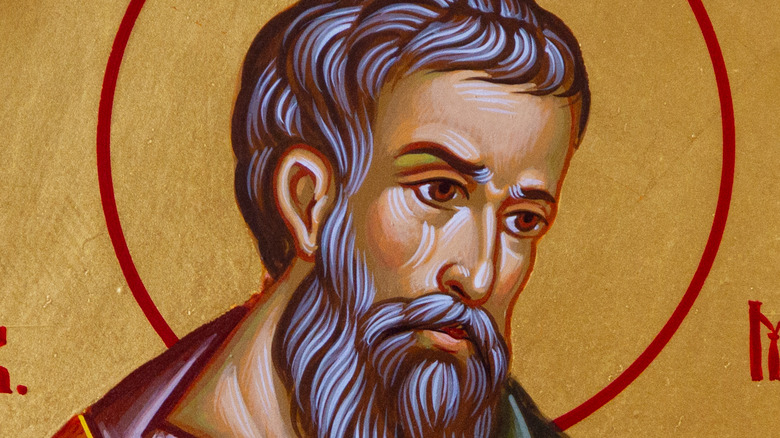When we hear a name like "Matthew," it often brings to mind a rich tapestry of history, doesn't it? So, too it's almost as if some names carry a special kind of weight, echoing through time. While our particular focus today is on the name "matthew geragos," the information we have at hand actually helps us look closely at a really significant figure from long ago, someone who truly shaped an important part of human history. It's a chance to consider how names themselves can hold so much story and meaning.
The text provided for us really shines a light on Matthew the Apostle, a person of great importance in Christian traditions. This Matthew was, in fact, one of the twelve close companions of Jesus. It's quite something to think about, isn't it, how a single individual could be so central to such a widely followed set of beliefs. We'll be spending some time getting to know more about this historical Matthew.
As we go through the details about this ancient figure, we can, in a way, appreciate the lasting power of names and the stories they carry. This exploration might give us a different kind of appreciation for how any "matthew geragos" today might also be part of a larger, ongoing narrative. It's all about understanding the deep roots of names and the remarkable lives associated with them, past and present.
Table of Contents
- Biography of Matthew the Apostle
- Matthew's Call to Follow Jesus
- The Gospel of Matthew: Its Purpose and Meaning
- Understanding the Birth of Jesus Christ
- The Meaning of Matthew in Scripture
- Frequently Asked Questions About Matthew the Apostle
- A Lasting Impression
Biography of Matthew the Apostle
Matthew, who was also, perhaps, called Levi, stands as a very significant person in the early story of Christianity. He was, actually, one of the twelve chosen apostles who walked alongside Jesus during his time on Earth. This role was, in some respects, incredibly important, placing him right at the heart of the earliest moments of a faith that would spread across the globe. It's a remarkable position to hold in the annals of history, isn't it?
Christian traditions tell us that this same Matthew was also one of the four evangelists. What this means is that he is believed to be the one who wrote the Gospel of Matthew. This book is a truly foundational piece of the New Testament, offering a unique perspective on the life and teachings of Jesus. So, he is known not just as a follower, but as a crucial recorder of events, which is pretty amazing.
The Gospel of Matthew itself is quite special. It is the first book you find in the New Testament part of the Bible. It also happens to be one of the three "synoptic gospels," which means it shares a lot of similar stories and sayings with the Gospels of Mark and Luke. This book, in a way, tells the story of Jesus from the perspective of someone who truly believed he was Israel's Messiah. It's a very personal account, you know?
A summary of this Gospel often covers many points. It provides information about the title of the book, who wrote it (or who is believed to have written it), when it might have been put to paper, and the order of events within it. It also touches on the main idea, the deep theological messages it contains, how it's laid out, and a general overview of its chapters. All of this helps people better understand its profound messages, which is really quite helpful.
Personal Details and Bio Data
| Detail | Information (from provided text) |
|---|---|
| Name | Matthew (possibly also Levi) |
| Role | One of the twelve apostles of Jesus; one of the four evangelists |
| Profession before following Jesus | Tax collector (or "publican") |
| Known for | Supposedly the author of the Gospel of Matthew |
| Key Biblical References | Matthew 1:1, Matthew 1:11, Matthew 9:9-10, Matthew 18:18 |
Matthew's Call to Follow Jesus
The story of how Jesus called Matthew to join him is a very striking one, honestly. As Jesus was moving along from one place, he saw a man named Matthew. This man was sitting at a tax booth, which was his place of work. This detail is really important, as it tells us a lot about Matthew's life before he met Jesus. It paints a picture, doesn't it?
Tax collectors in ancient Judaism were, to be honest, one of the most disliked professions. They were often seen as people who worked for the Roman authorities, collecting taxes that many felt were unfair, and sometimes, they were known to take extra money for themselves. This made them very unpopular, almost reviled, in their communities. So, for Jesus to call someone like that was quite unusual, you know?
Jesus simply told him, "Follow me." And, just like that, Matthew got up from his tax booth and followed him. This act shows a remarkable willingness to leave everything behind for a new path. It speaks volumes about the kind of person Matthew was, or perhaps, the profound impact Jesus had on him in that moment. It's a very simple command, but with such a powerful result.
Later on, something else happened that was also very telling. As Jesus was dining at a certain place, it's understood that Matthew was there too, along with other tax collectors and people considered "sinners." This gathering showed Jesus's willingness to spend time with those whom society often looked down upon. It really highlights a key part of his message, which is quite inspiring, actually.
It's interesting to note that, despite his importance as an apostle and an evangelist, little is truly known about Matthew's life beyond these key moments. The text tells us this directly. We have these powerful snapshots of his conversion and his work, but many of the smaller details of his personal life remain somewhat of a mystery. This can be frustrating for those who want to know everything, but it also adds a certain mystique to his story, doesn't it?
The Gospel of Matthew: Its Purpose and Meaning
The Gospel of Matthew is, pretty much, a cornerstone of the New Testament. It is the first book found there, and it holds a special place among the three synoptic gospels. The author of this gospel, believed to be Matthew the Apostle, aimed to tell the story of Jesus in a way that truly showed he was Israel's promised Messiah. This goal shapes the entire book, you see.
The book starts right away by presenting Jesus as the Christ, which means the "anointed one." Both "Messiah" in Hebrew and "Christ" in Greek carry this very same meaning. This introduction immediately sets the tone, letting readers know that this is a story about the long-awaited leader and savior. It's a powerful opening statement, to be honest.
The Gospel of Matthew also includes important family lineage details, like the mention of Jehoiachin in Matthew 1:11. These kinds of references were really important for showing Jesus's connection to the royal line of David, which was a key part of the Messiah's expected background. It ties Jesus directly into the history and prophecies of the Jewish people, which is quite significant.
This book is, in a way, a comprehensive account. It gives us a look at the title, who wrote it, when it was written, the order of events, its main idea, the deep theological points it makes, how it's structured, and a general overview of its many chapters. All these elements work together to present a clear and persuasive case for Jesus's identity and mission. It's a very well-thought-out piece of writing, you might say.
Understanding the Birth of Jesus Christ
The Gospel of Matthew also gives us a detailed account of the birth of Jesus Christ, which is, obviously, a central event in Christian belief. It begins by explaining how this extraordinary birth came about. This part of the story is quite unique and very important to the overall narrative. It sets the stage for everything that follows, you know?
It tells us that after Mary, Jesus's mother, was promised in marriage to Joseph, something truly remarkable happened. Before they had even come to live together as husband and wife, she was found to be with child. And this child was not conceived in the usual way, but through the Holy Spirit. This detail is absolutely crucial to the Christian understanding of Jesus's nature. It's a very profound claim, indeed.
The phrasing "now the birth of Jesus Christ was as follows" or "this is how the birth of Jesus Christ came about" really signals that a very specific and important explanation is coming. It's not just a casual mention; it's a careful detailing of a miraculous event. The Gospel writer wanted to make sure his readers understood the divine origin of Jesus right from the start. This part of the story is, really, quite moving for many people.
This account helps readers understand the very beginning of Jesus's life, showing his unique status from the moment of his conception. It sets him apart and underscores the special purpose he was believed to have. It's a powerful way to introduce the central figure of the Christian faith, which is pretty clever, actually. You can learn more about biblical history on our site, and link to this page here.
The Meaning of Matthew in Scripture
Beyond the person of Matthew the Apostle, the name "Matthew" itself holds meaning within the Bible, and it's something many people like to explore. You can, for instance, discover the specific meaning of "Matthew" when you look into biblical dictionaries and encyclopedias. These resources often provide a deeper appreciation for the names found in scripture, which is quite interesting.
When you study the definition of Matthew, you'll find that many bible dictionaries and encyclopedias offer various insights. They also point to different scripture references, not just in the New Testament but sometimes even in the Old Testament, where the name or its roots might appear. This kind of study helps people get a fuller picture of how names connect across the entire biblical narrative. It's a bit like tracing a family tree of words, you know?
This deeper look at the name "Matthew" helps us understand its significance beyond just identifying a person. It can reveal cultural contexts, linguistic origins, and even symbolic meanings that add layers to the stories. It's a way to truly immerse oneself in the text and its rich background. For many, this kind of study is very rewarding, you might say.
So, whether it's about the person of Matthew the Apostle or the broader meaning of the name, there is, clearly, a lot to learn and think about. It shows how even a single name can open up many avenues for exploration and reflection. This enduring interest in biblical names and figures, like Matthew, really speaks to their lasting impact on culture and faith, which is pretty amazing.
Frequently Asked Questions About Matthew the Apostle
People often have questions about important biblical figures, and Matthew the Apostle is certainly one of them. Here are a few common questions that might come to mind, based on the information we've looked at:
Was Matthew a tax collector before he followed Jesus?
Yes, absolutely. The text makes it quite clear that when Jesus called Matthew to join him, Matthew was indeed working as a tax collector. This profession was, as we discussed, generally not well-regarded in ancient Jewish society, which makes his decision to follow Jesus even more striking. It shows a real change in his life, doesn't it?
What is Matthew known for in the Bible?
Matthew is known for a couple of very important things, actually. First, he was one of the twelve apostles, a close companion of Jesus. Second, and very significantly, Christian traditions credit him as the author of the Gospel of Matthew, which is the first book in the New Testament. So, he's seen as both a direct witness and a crucial writer of early Christian history, which is pretty remarkable.
Is the Gospel of Matthew the first book of the New Testament?
Yes, that's right. The Gospel of Matthew is, in fact, the very first book found in the New Testament of the Bible. It is also considered one of the three "synoptic gospels," meaning it shares many stories and perspectives with Mark and Luke. Its placement at the beginning helps set the stage for the rest of the New Testament, which is quite fitting.
A Lasting Impression
Thinking about Matthew the Apostle, it's clear his story leaves a very lasting impression. From his surprising call to follow Jesus, leaving behind a disliked profession, to his role as a supposed author of a foundational gospel, his life was one of profound change and deep significance. His account of Jesus's life, especially the miraculous birth, continues to shape beliefs for countless people around the globe. It's a story that truly resonates, you know?
The enduring interest in figures like Matthew the Apostle, even today, shows how deeply these ancient narratives connect with human experience. Whether we are looking at the specific details of his life or the broader meaning of his name, there is much to consider and appreciate. It reminds us that stories from long ago still hold power and relevance in our current world. You can find out more about biblical studies by visiting a reputable resource online.
As we wrap up our thoughts on this important figure, and how the name "Matthew" carries such historical weight, it's a good moment to reflect. Perhaps you might feel inspired to explore more about these historical connections, or simply appreciate the deep meaning that names can carry through generations. It's a fascinating journey, really, into the past that continues to influence our present.



Detail Author:
- Name : Domenick Jacobs
- Username : hskiles
- Email : qoconnell@mccullough.com
- Birthdate : 2006-08-27
- Address : 4533 Adolfo Divide Apt. 574 East Alexys, MA 06257-6355
- Phone : +17343086336
- Company : Wisoky LLC
- Job : Conveyor Operator
- Bio : Aut provident commodi porro eveniet non voluptas. Maxime sed modi fuga dolorem totam. Qui consequatur quis maxime nisi est iure ut.
Socials
linkedin:
- url : https://linkedin.com/in/hipolito1678
- username : hipolito1678
- bio : Asperiores reiciendis illum qui natus molestiae.
- followers : 1745
- following : 1278
tiktok:
- url : https://tiktok.com/@schmitth
- username : schmitth
- bio : Earum nulla repudiandae praesentium mollitia quaerat.
- followers : 4161
- following : 1825